过去完成时(详细讲解)
九年级英语语法:过去完成时
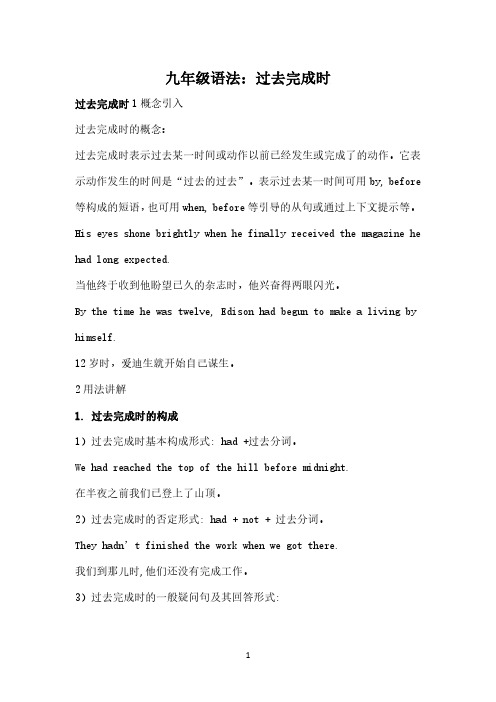
九年级语法:过去完成时过去完成时1概念引入过去完成时的概念:过去完成时表示过去某一时间或动作以前已经发生或完成了的动作。
它表示动作发生的时间是“过去的过去”。
表示过去某一时间可用by, before 等构成的短语,也可用when, before等引导的从句或通过上下文提示等。
His eyes shone brightly when he finally received the magazine he had long expected.当他终于收到他盼望已久的杂志时,他兴奋得两眼闪光。
By the time he was twelve, Edison had begun to make a living by himself.12岁时,爱迪生就开始自己谋生。
2用法讲解1. 过去完成时的构成1)过去完成时基本构成形式: had +过去分词。
We had reached the top of the hill before midnight.在半夜之前我们已登上了山顶。
2)过去完成时的否定形式: had + not + 过去分词。
They hadn’t finished the work when we got there.我们到那儿时,他们还没有完成工作。
3)过去完成时的一般疑问句及其回答形式:疑问句要把had提到句首;回答用Yes, 主语+ had. / No, 主语+ hadn’t.—Had he told you to go there earlier yesterday? 他昨天告诉过你早点儿到那儿吗?—Yes, he had. (No, he hadn’t.) 是的,他告诉了。
(不,他没有。
) 注意:had not 常简略为hadn't。
2. 过去完成时的用法过去完成时的主要用法和现在完成时一样。
不同的是,过去完成时把时间推移到了过去某一时间之前,与现在无关。
1)过去完成时表示在过去某一时间或动作以前已经完成了的动作。
过去完成时讲解及练习题(精讲)
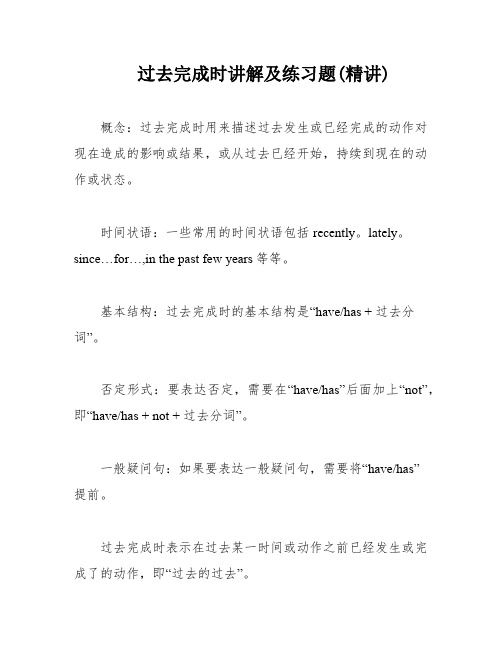
过去完成时讲解及练习题(精讲)概念:过去完成时用来描述过去发生或已经完成的动作对现在造成的影响或结果,或从过去已经开始,持续到现在的动作或状态。
时间状语:一些常用的时间状语包括recently。
lately。
since…for…,in the past few years等等。
基本结构:过去完成时的基本结构是“have/has + 过去分词”。
否定形式:要表达否定,需要在“have/has”后面加上“not”,即“have/has + not + 过去分词”。
一般疑问句:如果要表达一般疑问句,需要将“have/has”提前。
过去完成时表示在过去某一时间或动作之前已经发生或完成了的动作,即“过去的过去”。
构成:过去完成时由“助动词had + 过去分词”构成,其中had通用于各种人称。
例如:They had already had XXX(他们在到达酒店之前已经吃过早餐了。
)XXX 10:00 this morning.(今天早上10点前,她已经写完了作文。
)过去完成时的判断依据有两个:1.由时间状语来判定。
各种时态都有特定的时间状语。
与过去完成时连用的时间状语有:by + 过去的时间点,by the end of + 过去的时间点,before + 过去的时间点等等。
例如:I had finished reading the novel by nine o'clock last night.(昨晚9点前,我已经读完了这本小说。
)XXX English words by the end of last term.(上学期结束时,我们已经学了2000多个英语单词。
)They had XXX last XXX.(上XXX之前,他们已经种了600棵树。
)2.由“过去的过去”来判定。
过去完成时表示“过去的过去”,即过去某一动作之前已经发生或完成的动作,动作有先后关系,动作在前的用过去完成时,在后的用一般过去时。
过去完成时的详细讲解和练习题(全面解析)
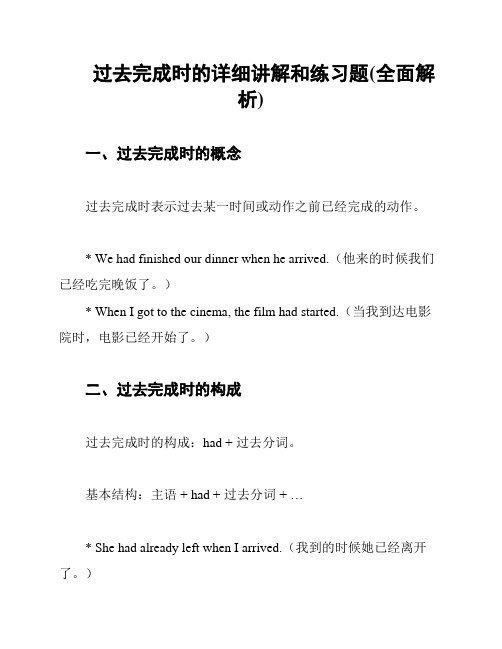
过去完成时的详细讲解和练习题(全面解析)一、过去完成时的概念过去完成时表示过去某一时间或动作之前已经完成的动作。
* We had finished our dinner when he arrived.(他来的时候我们已经吃完晚饭了。
)* When I got to the cinema, the film had started.(当我到达电影院时,电影已经开始了。
)二、过去完成时的构成过去完成时的构成:had + 过去分词。
基本结构:主语 + had + 过去分词+ …* She had already left when I arrived.(我到的时候她已经离开了。
)* I had finished my work before he called.(他打电话之前我已经完成了我的工作。
)三、过去完成时的用法1. 表示过去某个时间点之前已经完成的动作。
* They had gone out before I arrived.(我到之前他们就已经离开了。
)* She had read the book before she went to bed.(她在睡觉前已经读过那本书了。
)2. 表示过去的过去,即在过去某个时间或动作之前已经完成的动作。
常和过去时连用。
* He said that he had visited the museum before.(他说他以前去过博物馆。
)* She had finished her homework when her mother came back.(当她妈妈回来时,她已经完成了作业。
)四、过去完成时的练题1. __________(you, finish) your homework before you went to bed last night?2. By the time we arrived, the party __________(start) .3. I __________(not, see) the movie before last night.4. Before I came to China, I __________(study) Chinese for three years.5. They __________(already, leave) when I got to the station.【答案】1. Had you finished your homework before you went to bed last night?2. By the time we arrived, the party had started.3. I had not seen the movie before last night.4. Before I came to China, I had studied Chinese for three years.5. They had already left when I got to the station.。
精华版过去完成时讲解

精华版过去完成时讲解过去完成时是英语语法中的一个时态,用来表示在过去某一特定时间或动作之前已经发生或完成的动作。
在这篇文章中,我们将详细讲解过去完成时的用法和特点。
一、过去完成时的构成过去完成时的构成由“had + 过去分词”组成。
其中,“had”是过去完成时的助动词,根据主语的人称和数的变化进行变化,而过去分词则通常保持不变。
例如:1. I had finished my homework before my mom came home.我在我妈妈回家之前已经完成了我的作业。
2. They had already left when we arrived at the party.当我们到达派对时,他们已经离开了。
二、过去完成时的用法1. 表示在过去某一特定时间或动作之前已经发生或完成的动作。
例如:Before she arrived, he had already left.她到达之前,他已经离开了。
2. 表示过去某个时间点之前已经发生的动作。
By the time I got home, my sister had already eaten all the cake.当我到家时,我的妹妹已经把蛋糕都吃完了。
3. 在由时间状语从句引导的句子中,常用过去完成时表示在谓语动词所表示的动作之前发生的动作。
例如:She had finished her work before she went to bed.她上床睡觉前已经完成了她的工作。
4. 在条件句的结构中,过去完成时可以用来表示对过去情况的假设。
例如:If he had studied harder, he would have passed the exam.如果他学习更努力些,他就会通过考试。
三、过去完成时的注意事项1. 过去完成时经常与过去简单时连用,表示先后发生的两个动作。
例如:He had already left when I arrived.当我到达时,他已经离开了。
初中语法之过去完成时和过去将来时的讲解
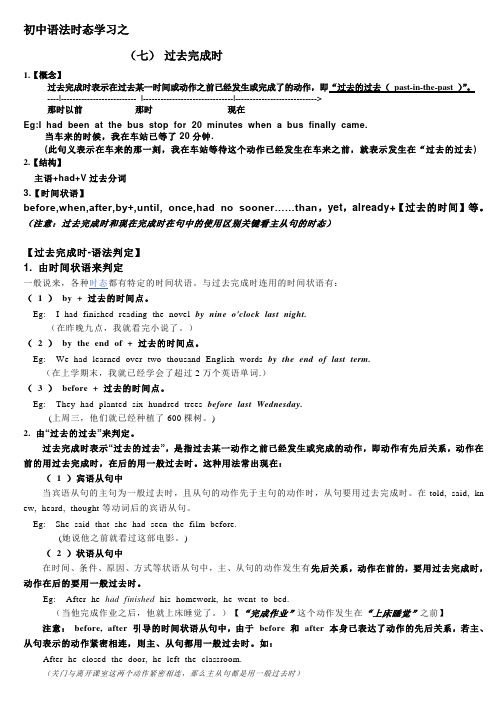
初中语法时态学习之(七)过去完成时1.【概念】过去完成时表示在过去某一时间或动作之前已经发生或完成了的动作,即“过去的过去(past-in-the-past )”。
----|-------------------------- |-------------------------------|---------------------------->那时以前那时现在Eg:I had been at the bus stop for 20 minutes when a bus finally came.当车来的时候,我在车站已等了20分钟.(此句义表示在车来的那一刻,我在车站等待这个动作已经发生在车来之前,就表示发生在“过去的过去) 2.【结构】主语+had+V过去分词3.【时间状语】before,when,after,by+,until, once,had no sooner……than,yet,already+【过去的时间】等。
(注意:过去完成时和现在完成时在句中的使用区别关键看主从句的时态)【过去完成时-语法判定】1. 由时间状语来判定一般说来,各种时态都有特定的时间状语。
与过去完成时连用的时间状语有:( 1 )by + 过去的时间点。
Eg: I had finished reading the novel by nine o'clock last night.(在昨晚九点,我就看完小说了。
)( 2 )by the end of + 过去的时间点。
Eg: We had learned over two thousand English words by the end of last term.(在上学期末,我就已经学会了超过2万个英语单词.)( 3 )before + 过去的时间点。
Eg: They had planted six hundred trees before last Wednesday.(上周三,他们就已经种植了600棵树。
过去完成时(详细讲解)PPT演示课件

过去完成时与现在完成时的区别 现在完成时表示的动作发生在过去, 但侧重对现在产生 的结果或造成的影响,与现在有关. 其结构为”助动词 have/has+过去分词”; 过去完成时则是一个相对的时 态, 它所表示的动作不仅发生在过去,更强调”过去的 过去”,只有和过去的某时或某动作相比较时,才用到它.
• They had arrived at the station by ten yesterday.
(说明不到10点就在车站了)
• They arrived at the station at ten yesterday.
(说明10点到车站的)
2) 在没有明确的时间状语做标志时,谓语 动词动作发生的时间先后须依据上下文来判 断,先发生的用过去完成时,后发生的用一 般过去时.
?ireadthebookbeforeistartedschoolhadreadhadtriedtheythoughtthattheytrytheirbesthadtried?theythoughtthattheytrytheirbesthadlefthadstarted?thepoorgirlneversawhergrandpabecausehepassawaybeforeshewasbornhadpassedaway?inotrealizeshewasntchineseuntilshespokehadntrealized2在没有明确的时间状语做标志时谓语动词动作发生的时间先后须依据上下文来判断先发生的用过去完成时后发生的用一般过去时
到目前为止我已经学会了3000个单词.
I have learned 3000 English words so far.
到那时我已经学会了3000个英语单词.
过去完成时(详细讲解)

目 录
• 过去完成时基本概念 • 过去完成时用法详解 • 过去完成时与现在完成时对比 • 过去完成时常见错误及纠正 • 过去完成时典型例句分析 • 过去完成时在写作和口语中的应用
01 过去完成时基本概念
定义与构成
定义
过去完成时表示在过去某一时间 或动作之前已经发生或完成的动 作,即“过去的过去”。
主语 + had + not + 过去分词:表示主语在过去某一时间之前尚未完成的动作,即“过去 的过去”的否定形式。
主语 + had + just/already/ever/never等 + 过去分词:这些副词与过去完成时连用,表示 不同的时间概念和语气。例如,“just”表示“刚刚”,“already”表示“已经”, “ever”表示“曾经”,“never”表示“从未”。
02 过去完成时用法详解
表示过去某一时间前已完成的动作
动作发生在过去的过去
过去完成时表示在过去某一时间或动 作之前已经发生或完成的动作,即“ 过去的过去”。
强调动作的完成
过去完成时强调动作在过去某一时间 之前已经完成,不强调动作发生的具 体时间。
表示过去某一时间前已开始并持续到过去的动作
动作在过去某一时间前开始
过去完成时还可以在复合句中表 达“过去的过去”,即在过去某 个时间之前已经完成的动作。
在复合句中,过去完成时常用在 主句或从句中,表示一个动作在 另一个动作之前已经完成。
例如:By the time he was ten, he had learned to play the piano. 他十岁时就已经学会了弹钢 琴。
02
现在完成时的时间参照点是现在 ,表示从过去某个不确定的时间 开始一直持续到现在的动作或状 态。
精华版过去完成时讲解

过去完成时一、过去完成时的概念与结构特点概念:过去完成时表示在过去某一时间或动作之前已经发生或完成了的动作,即“过去的过去(past-in-the-past )”。
----|--------------------------|-------------------------------|---------------------------->那时以前那时现在构成:过去完成时由“助动词had+ 过去分词”构成,其中had 通用于各种人称。
They had alreadyhad breakfastbeforethey arrived at the hotel.Shehad finished writingthe compositionby 10 :00 this morning.二、过去完成时的判断依据1. 由时间状语来判定一般说来,各种时态都有特定的时间状语。
与过去完成时连用的时间状语有:( 1 ) by +过去的时间点。
如: I had finishedreadingthe novelby nineo'clock last night. ( 2 ) by theendof + 过去的时间点。
如:We had learned over twothousand English words by the end of last term.( 3 )before + 过去的时间点。
如:They had planted six hundredtrees before lastWednesday.2. 由“过去的过去”来判定。
过去完成时表示“过去的过去”,是指过去某一动作之前已经发生或完成的动作,即动作有先后关系,动作在前的用过去完成时,在后的用一般过去时。
这种用法常出现在:( 1 )宾语从句中当宾语从句的主句为一般过去时,且从句的动作先于主句的动作时,从句要用过去完成时。
在told, said, knew, heard, thought等动词后的宾语从句。
初中英语过去完成时详细讲解

初中英语语法过去完成时详细讲解过去完成时是英语中一种表示过去某一时间点之前已经发生的动作或情况的时态。
它由"had + 过去分词"构成。
过去完成时的用法如下:1. 表示在过去某一时间点之前已经完成的动作:①She had already finished her homework when I arrived.(我到达时,她已经完成了作业。
)这里表示在我到达之前,她已经完成了作业。
②They had left before the concert started.(音乐会开始之前,他们已经离开了。
)这里表示在音乐会开始之前,他们已经离开了。
2. 表示在过去某一时间点之前持续的动作或状态:①He had been studying English for three years before he moved to England.(在他搬去英国之前,他已经学习英语三年了。
)这里表示在他搬去英国之前,他一直在学习英语。
需要注意的是,过去完成时强调的是过去某一时间点之前的动作或情况。
因此,常与过去的时间状语连用,如before、after等,以明确指定过去的时间点。
另外,过去完成时常与过去简单时连用,用于表示两个过去的动作或情况的先后顺序。
过去完成时的动作通常发生在过去简单时的动作之前。
例如:①She had finished her homework before she went to bed.(她在睡觉前已经完成了作业。
)②They had already left when I arrived at the party.(当我到达派对时,他们已经离开了。
)总结起来,过去完成时用于表示过去某一时间点之前已经发生的动作或情况,常与过去的时间状语连用,以明确指定过去的时间点。
同时,过去完成时通常与过去简单时连用,以表示两个过去的动作或情况的先后关系。
过去完成时讲解

过去完成时讲解过去完成时(Past Perfect Tense)用于表示在过去某个时间或事件发生之前已经完成的动作或状态。
它通常由助动词“had”和动词的过去分词构成。
过去完成时的结构如下:肯定句:主语 + had + 过去分词否定句:主语 + had not / hadn't + 过去分词疑问句:Had + 主语 + 过去分词?以下是一些例句以及对过去完成时的一些说明:1. I had already eaten when he arrived.(当他到达时,我已经吃过了。
)在这个例句中,过去完成时用来表示在他到达之前,我已经吃过饭了。
2. She had finished her homework before she went to bed.(她在睡觉前已经完成了作业。
)在这个例句中,过去完成时用来表示在她上床睡觉之前她已经完成了作业。
3. They hadn't seen the movie before it won the award.(在这部电影获奖之前,他们还没有看过。
)在这个例句中,过去完成时用来表示在电影获奖之前,他们还没有看过它。
过去完成时通常与另一个过去时态结合使用,以明确过去事件发生的顺序。
当表示两个过去动作的先后关系时,过去完成时一般用于较早发生的动作或状态,而过去时则用于较晚发生的动作。
例如:I had studied English before I moved to the United States.(在我搬去美国之前,我已经学过英语。
)在这个例句中,过去完成时表示在搬去美国之前,我已经学过英语。
而过去时“moved”则表示搬去美国这一晚一发生的动作。
总之,过去完成时用来表示在过去某个时间或事件之前已经完成的动作或状态,通常与另一个过去时态结合使用,以明确时间顺序。
过去完成时(详细讲解)

过去完成时一.定义过去完成时表示在过去某一时间或动作之前,已经发生的动作或存在的状态,也可说是“过去的过去”。
是一个相对的时态,只有在和过去某个时间或动作相比较时才会用到。
常与by,before等引导的时间连用,也可以用一个表示过去的动作来表示。
二、构成:have/has+v-ed三、用法1.过去完成时表示在过去某时或某个动作之前发生的动作或存在的状态或表示经历或经验.I said mother had been angry about your laziness since we moved here.The film had begun before we got to the cinema.2.过去完成时表示过去某一时间以前开始一直延续到那个时间并可能延续下去的动作。
常和by 或since, for引导的表时间的从句或短语连用,但必须要与一个表示过去时的动作相对照.He had worked in that school for three years before he came to our school.The film had already been on for half an hour when Millie got to the cinema.We hadn’t seen each other since he left Nanjing.3.过去完成时表示在某一动作之前已经完成的动作. 过去的时间由before, after, when引导的时间从句表示出来.I had finished cooking dinner before you came back.The class had begun when I got to schoolHe had left before I got home.4.在told, said, knew, heard, thought等动词引导的宾语从句中,一般用过去完成时。
过去完成时讲解全解课件

选择题练习
答案与解析: A. been on (正确)
选择题练习
• B. come on
ቤተ መጻሕፍቲ ባይዱ
填空题练习
• 填空题1: By the time I my homework, my parents dinner.
填空题练习
• 答案与解析:
• 填空1答案与解析: finished (正确) • 填空2答案与解析: had cooked (正确) • 解析: 句意是“当我完成作业的时候,我的父母已经做好了晚饭”。根据时间状语从
翻译练习
• 翻译1: 我已经完成了我的作业,现在我可以去看电影了。
翻译练习
01
答案与解析:
02
翻译: I have finished my homework, now I can go to the movies. (正确)
03
解析: 这句话的意思是“我已经完成了作业,现在我可以 去看电影了”。根据语境可知,这句话应该用现在完成时, 表示过去的某个动作对现在的影响。因此,正确的翻译是 “I have finished my homework, now I can go to the movies”。
在过去的某个时间点之前已经存在的状态
01
总结词
表示在过去的某个时间点之前已经存在的状态,这个状 态可能一直持续到该时间点。
03
02
详细描述
过去完成时也可以用来描述在过去的某个时间点之前已 经存在的状态,这个状态可能一直持续到该时间点,并 且可能对后续的状态或动作产生影响。
示例
He had known her for many years before they got married. (在他们结婚之前,他已经认识她很多年了。)
过去完成时态讲解及练习
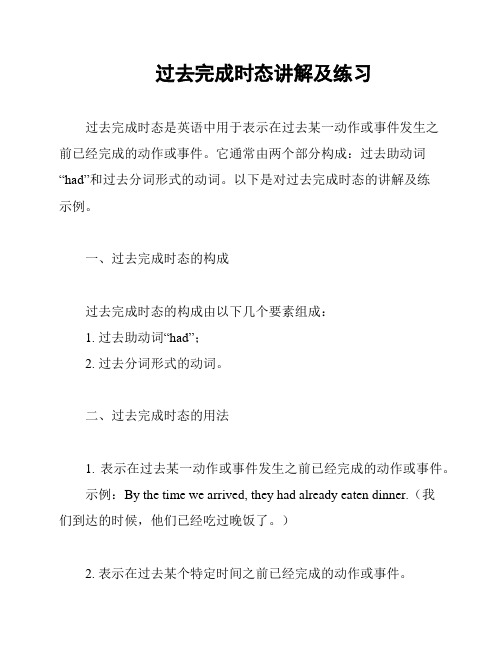
过去完成时态讲解及练习过去完成时态是英语中用于表示在过去某一动作或事件发生之前已经完成的动作或事件。
它通常由两个部分构成:过去助动词“had”和过去分词形式的动词。
以下是对过去完成时态的讲解及练示例。
一、过去完成时态的构成过去完成时态的构成由以下几个要素组成:1. 过去助动词“had”;2. 过去分词形式的动词。
二、过去完成时态的用法1. 表示在过去某一动作或事件发生之前已经完成的动作或事件。
示例:By the time we arrived, they had already eaten dinner.(我们到达的时候,他们已经吃过晚饭了。
)2. 表示在过去某个特定时间之前已经完成的动作或事件。
示例:She had finished her homework by 8 o'clock last night.(昨晚8点以前,她已经做完了作业。
)三、过去完成时态的注意事项1. 过去完成时态通常与表示过去的时间状语连用,例如“by the time”,“before”,“after”,“when”,“until”等。
示例:By the time they woke up, the sun had already risen.(他们醒来时,太阳已经升起。
)2. 注意句子的时态一致性,主句使用过去时态时,从句可使用过去完成时态。
示例:He said that he had already been to Japan twice.(他说他已经去过日本两次。
)四、过去完成时态的练以下是一些练题,帮助巩固对过去完成时态的理解:1. 他们已经完成了工作吗?2. 昨天晚上我在睡觉前已经刷牙了。
3. 他们在我到达之前已经离开了。
4. 你曾经去过那个城市吗?5. 吉姆离开前已经呆了一个小时了。
请根据上述规则和示例完成练题,加深对过去完成时态的掌握。
以上是关于过去完成时态的讲解及练习。
希望通过本文档的阅读和练习,您能更好地理解和掌握过去完成时态的用法和构成。
精华版过去完成时讲解
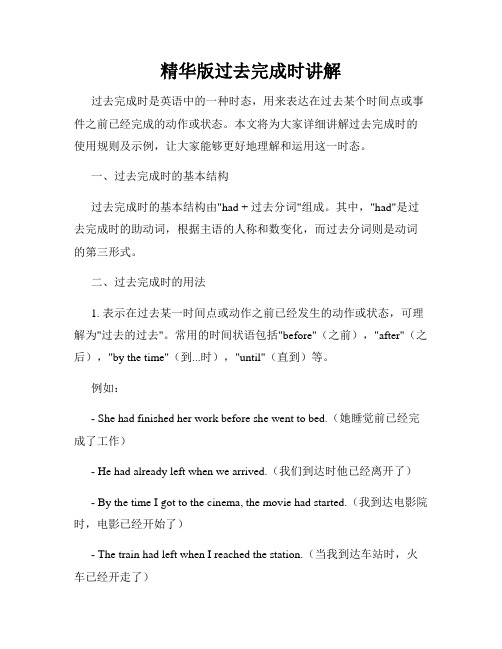
精华版过去完成时讲解过去完成时是英语中的一种时态,用来表达在过去某个时间点或事件之前已经完成的动作或状态。
本文将为大家详细讲解过去完成时的使用规则及示例,让大家能够更好地理解和运用这一时态。
一、过去完成时的基本结构过去完成时的基本结构由"had + 过去分词"组成。
其中,"had"是过去完成时的助动词,根据主语的人称和数变化,而过去分词则是动词的第三形式。
二、过去完成时的用法1. 表示在过去某一时间点或动作之前已经发生的动作或状态,可理解为"过去的过去"。
常用的时间状语包括"before"(之前),"after"(之后),"by the time"(到...时),"until"(直到)等。
例如:- She had finished her work before she went to bed.(她睡觉前已经完成了工作)- He had already left when we arrived.(我们到达时他已经离开了)- By the time I got to the cinema, the movie had started.(我到达电影院时,电影已经开始了)- The train had left when I reached the station.(当我到达车站时,火车已经开走了)2. 过去完成时也可用于虚拟语气,表示对过去某一动作的假设或想象。
例如:- If I had known the truth, I would not have made that mistake.(如果我当时知道真相,我就不会犯那个错误)- If he had studied harder, he would have passed the exam.(如果他学习更努力,他就能通过考试)3. 在间接引语中,当陈述句发生的时间先于引述动词的时间时,常使用过去完成时。
完整版)初中过去完成时讲解
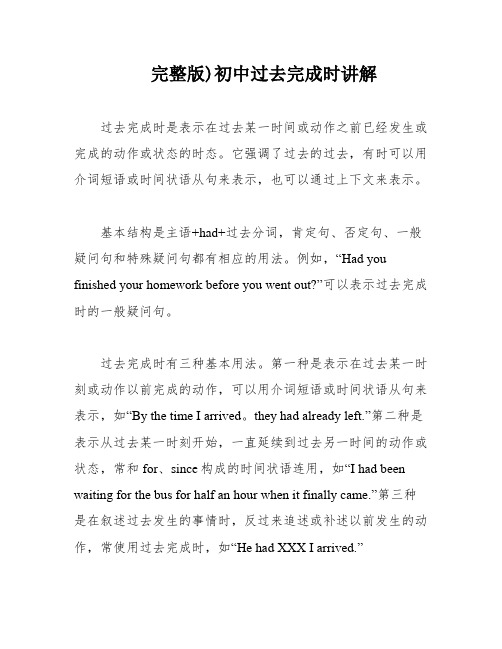
完整版)初中过去完成时讲解过去完成时是表示在过去某一时间或动作之前已经发生或完成的动作或状态的时态。
它强调了过去的过去,有时可以用介词短语或时间状语从句来表示,也可以通过上下文来表示。
基本结构是主语+had+过去分词,肯定句、否定句、一般疑问句和特殊疑问句都有相应的用法。
例如,“Had you finished your homework before you went out?”可以表示过去完成时的一般疑问句。
过去完成时有三种基本用法。
第一种是表示在过去某一时刻或动作以前完成的动作,可以用介词短语或时间状语从句来表示,如“By the time I arrived。
they had already left.”第二种是表示从过去某一时刻开始,一直延续到过去另一时间的动作或状态,常和for、since构成的时间状语连用,如“I had been waiting for the bus for half an hour when it finally came.”第三种是在叙述过去发生的事情时,反过来追述或补述以前发生的动作,常使用过去完成时,如“He had XXX I arrived.”在含有定语从句的主从复合句中,如果叙述的是过去的事,先发生的动作常用过去完成时,如“The book。
which I had read before。
was very interesting.”需要注意的是,过去完成时不应该和过去时混淆使用,因为它们的时间点不同。
过去完成时强调了过去的过去,而过去时则只是表示过去的动作或状态。
5) The past perfect tense is often used in the object clauses (or indirect speech) after verbs such as told。
said。
knew。
heard。
thought。
etc。
In this case。
初中过去完成时讲解
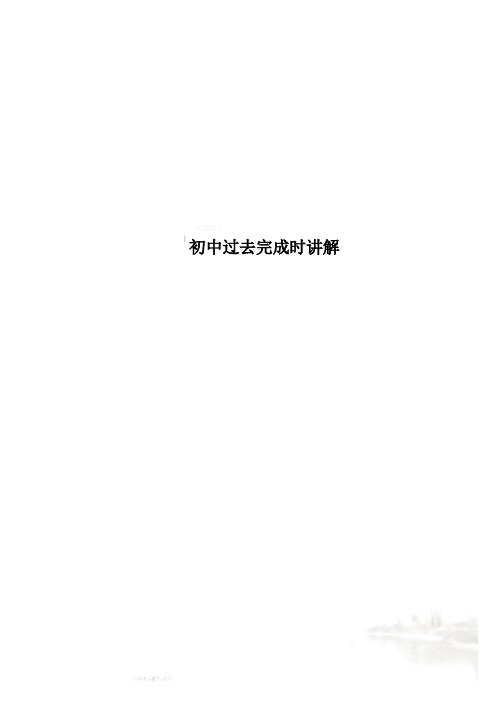
初中过去完成时讲解过去完成时定义过去完成时(past perfect)表示在过去某一时间或动作之前已经发生或完成了的动作或状态。
它表示句子中描述的动作发生在“过去的过去”。
基本结构主语+had+过去分词vpp.(done) ①肯定句:主语+had+过去分词.②否定句:主语+had+not+过去分词.③一般疑问句:Had+主语+过去分词? 肯定回答:Yes,主语+had.否定回答:No,主语+had not .④特殊疑问句:特殊疑问词或词组+一般疑问句(Had+主语+过去分词)?基本用法(1)表示在过去某一时刻或动作以前完成了的动作,也可以说过去的时间关于过去的动作。
即“过去的过去”。
可以用by, before,by the time +从句等介词短语或一个时间状语从句来表示,也可以用一个表示过去的动作来表示,还可能通过上下文来表示。
例如:By nine o’clock last night, we had got 200 pictures from the spacesh ip. 到昨晚9点钟,我们已经收到200 张飞船发来的图片。
(2)表示由过去的某一时刻开始,一直延续到过去另一时间的动作或状态,常和for, since构成的时间状语连用。
例如:I had been at the bus stop for 20 minutes when a b us finally came. 当车来的时候,我在车站已等了20分钟。
He said he had worked in that factory since 1949. 他说自从1949年以来他就在那家工厂工作。
(3)叙述过去发生的事情,在已叙述了过去发生的事情后,反过来追述或补述以前发生的动作时,常使用过去完成时。
例如:Mr. Smith died yesterday. He had been a good friend of mine.史密斯先生昨天去世了。
高中英语语法过去完成时专题讲解

高中英语语法过去完成时专题讲解(一)过去完成时1.过去完成时:✈1).概念:过去发生或已经完成的动作对现在造成的影响或结果,或从过去已经开始,持续到现在的动作或状态。
✈2).时间状语:recently, lately, since…for…,in the past few years, etc.✈3).基本结构:have/has + done✈4).否定形式:have/has + not +done.✈5).一般疑问句:have或has提前概念:过去完成时表示在过去某一时间或动作之前已经发生或完成了的动作,即过去的过去(past-in-the-past ) ----|-------------------------- |-------------------------------|----------------------------> 那时以前 那时 现在 构成:过去完成时由"助动词had + 过去分词"构成,其中had 通用于各种人称。
They had already had breakfast before they arrived at the hotel.She had finished writing the composition by 10 :00 this morning.2、过去完成时的判断依据:由时间状语来判定✈ 1 )by + 过去的时间点。
Eg: I had finished reading the novel by nine o'clock last night.✈ 2 )by the end of + 过去的时间点。
Eg: We had learned over two thousand English words by the end of last term.✈ 3 )before + 过去的时间点。
Eg: They had planted six hundred trees before last Wednesday.3.课堂练习:一.用动词的适当形式填空1. We _____________ (paint) the house before we ______________ (move) in.2. That rich old man _____________ (make) a will before he _____________ (die).3. They _____________ (study) the map of the country before they ________ (leave).4. The robbers _____________ (run away ) before the policemen_______ (arrive).5. I __________ (turn off) all the lights before I ____________ (go) to bed.6. Paul __________ (go) out with Jane after he __________ (make) a phone call.7. Tom __________ (say) he ___________ (read) the book twice.8. Our plan ____________ (fail ) because we _____________ (make) a bad mistake.9. When the chairman ______________ (finish) speaking, he _____________ (leave)the hall.10.The Reads __ ______ (have) lunch when I ________________(get) to their house.二.句型转换1.I had sold the ticket when she came.(改否定句)2.She had sung a song to us before she danced.(改否定句)3.They began to climb the mountain after they had bought all the food and drinks.(否定)4.By 10:00 a.m, I had been very hungry. (改一般疑问)5.Lucy had already completed the project when I arrived.(改一般疑问)6.By the time he got to the airport, the plane had taken off. (改一般疑问)7..He had broken his arm when I saw him.(对划线部分提问)8.When he had read the note, he ate it. (对划线部分提问)9..Jack didn’t go to the cinema because he had seen the film. (对划线部分提问)10.We had had the toys for ten years before we gave them to the child. (对划线部分提问)Keys:一、1. had painted... moved 2. had made ... died 3. had studied…left4. had run away..arrived5. had turned off …went 6. went …had made 7. said …had read 8 failed …had made9. (had) finished …left 10. were having/had had …got二、1.I hadn't sold the ticket when she came.2. She hadn't sung a song to us before she danced.3. They didn't begin to climb the mountain after they had bought all the food and drinks.4. Had you been very hungry by 10:00 a.m?5. Had Lucy completed the project when I arrived yet?6. Had the plane taken off by the time he got to the airport?7. What had he done when you saw him?8.What did he do when he had read the note?9. Why didn't Jack go to the cinema?10. How long had you/we had the toys before you/we gave them to the child?(二)过去将来时:定义:它表示从过去某一时间来看将要发生的某个动作或存在的某种状态。
初中英语语法大全之过去完成时详解

初中英语语法大全之过去完成时详解过去完成时是表示发生在过去的动作对过去晚些时候造成的影响或结果,或过去某一动作一直持续到过去晚些时候将来可能还要延续。
下面就是老师为同学们带来的对过去完成时的详细讲解,供同学们学习的参考。
总结过去完成时①表示发生在过去的动作对过去晚些时候造成的影响或结果②过去某一动作一直持续到过去晚些时候将来可能还要延续。
一、基本结构:主语+had+过去分词①肯定句:主语+had+过去分词.②否定句:主语+had+not+过去分词.③一般疑问句:Had+主语+过去分词?肯定回答:Yes,主语+had.否定回答:No,主语+hadnot.④特殊疑问句:特殊疑问词或词组+一般疑问句(Had+主语+过去分词)?二、基本用法1)表示在过去某一时刻或动作以前完成了的动作,也可以说过去的时间关于过去的动作。
即“过去的过去”。
可以用by,before等介词短语或一个时间状语从句来表示,也可以用一个表示过去的动作来表示,还可能通过上下文来表示。
例如:Bynineo’clocklastnight,wehadgotten200picturesfromthesp aceship.到昨晚9点钟,我们已经收到200张飞船发来的图片。
2)表示由过去的某一时刻开始,一直延续到过去另一时间的动作或状态,常和for,since构成的时间状语连用。
例如:Ihadbeenatthebusstopfor20minuteswhenabusfinallycame.当车来的时候,我在车站已等了20分钟。
Hesaidhehadworkedinthatfactorysince1949.他说自从1949年以来他就在那家工厂工作。
3)一般说来,各种时态都有特定的时间状语。
与过去完成时连用的时间状语有:(1)by+过去的时间点。
如:Ihadfinishedreadingthenovelbynineo’clocklastnight.(2)bytheendof+过去的时间点。
- 1、下载文档前请自行甄别文档内容的完整性,平台不提供额外的编辑、内容补充、找答案等附加服务。
- 2、"仅部分预览"的文档,不可在线预览部分如存在完整性等问题,可反馈申请退款(可完整预览的文档不适用该条件!)。
- 3、如文档侵犯您的权益,请联系客服反馈,我们会尽快为您处理(人工客服工作时间:9:00-18:30)。
2. 当Millie到达电影院的时候, 电影已经开始了半个小时了.
The film had already been on for half an hour when Millie got to the cinema.
for
ten
minutes
when
A. had already been on B. had already begun
C. have already been on D. have already begun
1. 他来我们学校之前已经在那所学校工作了三年.
He had worked in that school for three years before he came to our school.
基本用法:
1. 过去完成时表示在过去某时或某个动作之 前发生的动作或存在的状态或表示经历或经验.
(1) 我说自从你搬到这儿以来妈妈一直为你的懒惰 而生气.
I said mother had been angry about your laziness since we moved here.
(2) 我到达电影院之前电影早已经开始了.
past perfect tense 过去完成时由had +过去分词构成 表示过去的过去 生的动作 构成方式: 肯定句: had+动词的过去分词
否定句: had not+ 过去分词
一般疑问句:had+ 主语+ 过去分词
肯定回答: Yes, 主语+ had. 否定回答: No, 主语+ hadn’t.
到目前为止我已经学会了3000个单词.
I have learned 3000 English words so far.
到那时我已经学会了3000个英语单词.
I had learned 3000 English words till then.
1.过时去完间成状时语与一不般同过去.时过的去区别完成时在时间上强调“过去 的过去”,而一般过去时只强调过去某一特定的 时间
( B )9. The film ______ when I got there.
A. has begun B. had already started C .began D. have al
)10. The film _______ got to the cinema.
He entered the room, turned on the light and read an evening paper.
I (had) called her before I left the office.
More practice •When I arrived there, they_h_a__d__le__ft___(leave) already. •The film__h_a_d__s_t_a_r_t_e_d__(start),when we got to the
I had finished cooking dinner before you came back.
2. 当我赶到学校时, 已经开始上课了.
The class had begun when I got to school.
3. 在我到家之前他已经走了.
He had left before I got home.
6. 贝尔在30岁前发明了电话.
Bell had invented the telephone before he was 30.
7. 在他搬进这个小区(residential quarter)之前,那对夫妇已经 在这儿住了三年了.
The young couple had lived here for three years before he moved in the residential quarter.
The result was better than what we had expected.
2. 我们期望你会来的,但是你没有来。
We had hoped that you would come, but you didn't.
昨天我试见作到比王较先:生了.自从他离开北京我们就一直未曾见过面。
( D )8. I saw Kate with a new radio in her hand
yesterday, but she told me she______the radio for ten days. A. has bought B. had bought C. has had D. had had
4. 到上学期末,我们已经学历4000多个单词.
By the end of last term, we had learnt over 4,000 words.
5. 我们完成这项工作比预料中的时间要早的多.
We finished the work much earlier than we had expected.
The film had begun before we got to the cinema.
2. 过去完成时表示过去某一时间以前开始一直 延续到那个时间并可能延续下去的动作。常和by 或since, for引导的表时间的从句或短语连用, 但必须要与一个表示过去时的动作相对照.
1. 他来我们学校之前已经在那所学校工作了三年.
3. Tom说他借了这本书两周了。
Tom said he had borrowed the book for 2 weeks.
kept
5. 表示意向的动词,如hope, wish, expect, think, mean, suppose等,用过去完成时表示 “原本……,未能……”。
1.结果比我们想象的要好。
过去完成时与现在完成时的区别 现在完成时表示的动作发生在过去, 但侧重对现在产生 的结果或造成的影响,与现在有关. 其结构为”助动词 have/has+过去分词”; 过去完成时则是一个相对的时 态, 它所表示的动作不仅发生在过去,更强调”过去的 过去”,只有和过去的某时或某动作相比较时,才用到它.
2. 当Millie到达电影院的时候, 电影已经开始了半个小时了.
The film had already been on for half an hour when Millie got to the cinema.
3. 自从他离开南京我们就一直没有见过面.
We haven’t seen each other since he left Nanjing.
A. hadn’t had B. hasn’t had C. wouldn’t have D. was having
( D)3. By the end of last year we ____ each other
for ten years. A. have known B. knew C. were knowing D. had known
3. 自从他离开南京我们就一直没有见过面.
We hadn’t seen each other since he left Nanjing.
3. 过去完成时表示在某一动作之前已经完 成的动作. 过去的时间由before, after, when引导的时间从句表示出来.
1. 我在你回来之前就已经把晚饭准备好了.
_h__a_d__p_a__s_s_e_d__a_w__a_y (pass away) before she was born.
•I _h__a_d_n__’t__r_e_a_l_iz_e_d (not realize) she wasn’t Chinese
until she spoke.
选择填空
( c )1.--- “Did you see Tom at the party?”
---“No, Mary told me that he ___ by the time I got there.” A. left B. was leaving C. had left D. has left
( A)2. He said that he ____ his lunch yet.
I saw Mr. Wang yesterday. We had not seen each other since he left Beijing.
自从他离开北京我们就一直未曾见过面。
We have not seen each other since he left Beijing.
试比较: 1. 我在这工作已经五年了。 2. 到2005年8月,我在这工作已经五年了。
现在完成时
The present perfect tense:
Have / has + the past participle I have received a letter from Lily recently. Has he handed in her homework yet? He has just gone to Beijing. They have never been to the USA. We have lived here for ten years.
( c)4. I saw Li Lei yesterday.
We hadn’t seen each other ______ I left Beijing. A. after B. before C. since D. until
( c )6. I learned_______ the city for a long
